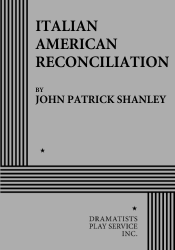
THE STORY: Huey Maximilian Bonfigliano has a problem: While he is safely divorced from his shrewish first wife, Janice, who shot his dog and even took a bead on him, he feels he cannot regain his “manhood” until he woos and wins her one more time—if only to put his broken marriage behind him once and for all. He enlists the aid of his lifelong buddy, Aldo Scalicki, a confirmed bachelor who tries, without apparent success, to convince Huey that he would be better off sticking with his new lady friend, Teresa, a usually placid young waitress whose indignation flares when she learns what Huey is up to. In a moonlit balcony scene (hilariously reminiscent of Cyrano de Bergerac) Aldo pleads his lovesick friend’s case and, to his astonishment, Janice capitulates—although not for long. However we do learn that her earlier abuse of Huey was intended to make him “act like a man” which, at last, he does. And, more than that, he (and the audience) become aware that, in the final essence, “the greatest—and only—success is to be able to love” —a truth which emerges delightfully from the heartwarming, wonderfully antic and always imaginatively conceived action of the play.
A fanciful, lighthearted and zestfully comic exploration of male/female relationships, and the sometimes unsettling (and very funny) complications that can ensue.
“He writes wonderful Runyonesque dialogue—a sort of gritty, downtown version of sparkling drawing-room comedy—and highly rhetorical speeches that are fun to hear, because actors love to perform them.” —The New Yorker.
“Ultimately Shanley is telling us a tall tale but he does it with so much humor, so much winsome charm that it is almost irresistible.” —New York Daily News.
“…bathed in the same moonlit madness that gave his Moonstruck screenplay its savor and flavor…A lovely play.” —New York Post.
